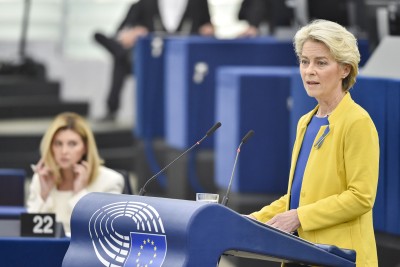State of the EU 2022 Speech: Austria Wants to Usher in a Modern EU Future
The State of the EU address by Commission President Ursula von der Leyen addressed many acute issues, including the war in Ukraine and its international repercussions. Austria's Minister for Europe responded.
 Ursula von der Leyen during the State of the European Union Address. / Picture: © EU European Union
Ursula von der Leyen during the State of the European Union Address. / Picture: © EU European Union
In her State of the EU address, Commission President Ursula von der Leyen addressed many acute issues. For example, as so often, the war in Ukraine and its international repercussions took centre stage.
Europe is being put to the test, the Commission President stressed: "This is not just a war by Russia against Ukraine. This is a war against our energy supply, a war against our economy, a war against our values and a war against our future."
Support for Ukraine and its people would be continuous and long-term, von der Leyen said, announcing emergency aid of 100 million euros to rebuild Ukrainian schools.
Once again, von der Leyen held out the prospect of EU membership for the country: "Our Union is not complete without you." The same also applied to the countries of the Western Balkans, Moldova and Georgia, which, in the words of the Commission President, were also "part of our family".
The energy crisis was also addressed by von der Leyen in her speech. Rather than relying on Russia for fossil fuels, the EU must rely on reliable suppliers like Norway or the United States, she said. Further investments in renewable energies, particularly hydrogen, are also needed, the Commission President said.
Europa should not become dependent on new energy sources, Commission President von der Leyen said in her speech. Because of the ecological transformation, rare earths and lithium will become more important than oil and gas in the future.
The demand for rare earths will increase fivefold by 2030. In order to represent its values and interests externally, the EU needed to expand its partnerships with democratic states.
Support from Austria
"Europe is facing great challenges. We must now take the necessary steps for a modern European Union of the future. Commission President Ursula von der Leyen has given important impulses for this today," emphasised Minister for European Affairs Karoline Edtstadler in a first reaction to the "State of the Union Address" by the President of the European Commission before the European Parliament in Strasbourg.
The EU is growing in the crisis and has demonstrated this impressively since the beginning of the Russian war of aggression, in particular through clear and effective sanctions packages and extensive support for Ukrainian civil society in response to the blatant breach of international law.
In her speech, the President of the European Commission focused on the current challenges, emphasised the Minister for Europe, who considers the decoupling of electricity and gas prices to be a "more than necessary step". "It is particularly important now to put Europe's geopolitical interests first, to return to Europe's economic power and to sustainably strengthen the European Union internally."
Europe must be "world champion of innovation, champion of value creation and thus pioneer the highest quality of life". In order to fully exploit the potential of the European Single Market, it is also necessary to find solutions for the shortage of skilled workers, Edtstadler stressed, welcoming the Commission President's proposals in this regard and also the intention to make 2023 the "European Year of Education and Training".
"Against the background of growing threats, the strength of the European Union lies in its unity. We need strong European institutions that at the same time have broad acceptance among the population," explained Edtstadler, who pointed out the following with regard to institutional reforms: "Should the Convention announced by Commission President Ursula von der Leyen come to pass, the focus must be on sustainably strengthening Europe internally."



